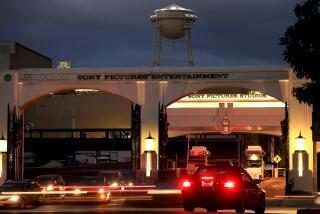Time Warner quits China cinema deal, citing rules
- Share via
In an about-face that highlights Hollywood’s long-standing tensions with China, Time Warner Inc. is pulling out of an ambitious, four-year theater venture in the country because of tightened restrictions on foreign ownership.
The decision, announced Wednesday, came after its Warner Bros. unit tried unsuccessfully for more than a year to negotiate a compromise with the Chinese government over a July 2005 ruling requiring outside investors to cede control in ventures to their Chinese partners.
Warner’s decision underscores Hollywood’s frustrations operating in China. Although studio executives consider China to be the world’s best growth opportunity for U.S. entertainment, they also are wary of expanding there, in part because of what they believe are burdensome government rules.
“We are disappointed that we must stop our investments in cinemas due to significant regulatory changes,” New York-based Time Warner said in a statement.
For decades China had been off-limits to foreign companies but in recent years has attracted the likes of media giants Time Warner, Walt Disney Co., News Corp. and Viacom Inc. But since 2005 those companies have become increasingly frustrated by Beijing’s reluctance to allow more foreign movies to be shown and grant licenses for television channels. Censorship and piracy also hamper foreign media.
Although hoping to one day return to the theater-building business in China, Time Warner said it remained committed to its other operations there that had different legal and regulatory structures. They include a local language film production, a home-video venture, consumer products operations and studio stores.
Warner Bros. International Cinemas operates four state-of-the-art cinemas with local partners, two with Shanghai Film Group Corp. and two with Shenzhen Investment Trust.
The 11-screen Paradise Warner Cinema City in a luxurious shopping mall in Shanghai’s bustling Xujiahui area has been the highest-grossing theater location in China for the last three years, screening domestic and foreign movies. The Oliver Stone-directed “World Trade Center” begins showing today there at $9 a ticket.
Warner Bros. established its cinemas as a foothold in the fast-growing market. Warner eventually planned to increase the number of locations to 30, encouraged by an easing of rules in 2003 to let foreigners hold as much as 75% of cinema ventures in selected cities. But last year’s change of heart by the government crimped its plans.
Yu Guoming, vice dean at Renmin University’s School of Journalism and Communication, suggested that Warner and other global players had unrealistic expectations.
“For global media companies to enter China, you should have more patience to gradually penetrate into the market. Warner and many other foreign media giants want to make progress by leaps and hit some milestones.... This is against the rules of the game in China,” Yu said.
Ren Zhonglun, president of Shanghai Film Group, Warner Bros.’ joint-venture partner, said he was “surprised to hear the news and felt regretful about Warner’s decision.”
“We had a pleasant cooperation.... These cinemas are developing really well,” said Ren. “It’s their headquarters’ decision. They didn’t tell us why.... But they say they will completely pull out of cinema operations.”
Movie ticket sales in China soared 30% last year to $254 million. Warner Bros.’ “Harry Potter and the Goblet of Fire” was the country’s top-grossing movie of the year, according to the state-owned New China News Agency.
So far this year, China’s box-office receipts have surged an estimated 35%. Currently China has only about 3,000 screens in the country, or roughly one cinema for every 450,000 people.
“Generally speaking, the Chinese filming industry is going straight up rapidly,” Ren said. “The market environment is getting better and better.”
But some analysts in China were not surprised at Warner’s pullout. In recent months, Beijing has further clamped down on outside media, restricting foreign animation on TV and suddenly canceling “The Da Vinci Code” in theaters. And it has given no indication of loosening up in the near future.
David Wolf, a media consultant in Beijing, said the hostile regulations and uncertainties of the future had forced foreign media companies to reconsider their business plans in China.
“They’re really beginning to question the assumptions of coming here in the first place,” Wolf said.
Wolf added that Beijing’s tightened regulations on foreign media, while reflecting the current political climate, also were being driven by classic protectionism.
“If there’s going to be a popcorn economy, they want to be the ones to run it,” he said.
*
Friedman reported from Los Angeles. Lee reported from Shanghai.
More to Read
The biggest entertainment stories
Get our big stories about Hollywood, film, television, music, arts, culture and more right in your inbox as soon as they publish.
You may occasionally receive promotional content from the Los Angeles Times.











